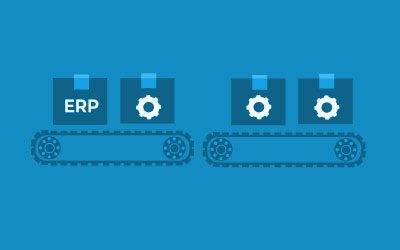Process management, inventory management and accounting are just a few important features of manufacturing ERP software. By implementing a manufacturing-specific Enterprise Resource Planning (ERP) system, you can streamline business processes while more accurately generating prices and calculating total costs. Acumatica Manufacturing Edition has what manufacturing companies need to operate efficiently. However, for an ERP system to work in manufacturing, it must have these five things:
1. A Way to End to Blind Scheduling
Blind scheduling, i.e. scheduling without reference to actual orders, can lead to excess inventory and inefficiencies in plant operations. To foster efficient planning, ERP software must use real customer orders and demand forecasts to plan purchases and create realistic production schedules. A manufacturer can then assure all materials, products and parts are available when needed, in the right quantities. Coordinating activities, completing work on time and using resources more efficiently can avoid this even as demand changes or unexpected disruptions occur.
2. Ability to Reduce Expediting
In the manufacturing sector, expediting is the least efficient way to run an operation. Costs quickly go out of control as companies pay premium prices for materials to accommodate favored jobs. Acumatica Advanced Manufacturing Edition integrates costing functions in all operational subsystems. An ERP system must also collect/manage cost data for materials, labor and overhead in a production environment, while offering traceability of items, barcode data collection and tracking of labor.
3. Ability to Control Engineering Changes
The demand for product complexity and variety has increased. Therefore, an ERP system must account for complex product designs in multi-level bills of material (BOMs). Detailed routing and support for multiple product revisions are needed to track anything being designed, assembled or fabricated. A revision control system improves coordination, record keeping and tracking of pending changes. With visibility into complete, accurate data, companies can better manage material procurement, production scheduling and field service in the face of engineering changes.
4. Elimination of Outdated Business Information
Manufacturers need the most current information to improve decision making. The visibility provided by ERP software supports the manufacturing of complex, customized products; adoption of new manufacturing methods and technologies; and balancing of supply with demand. Acumatica integrates information across applications while updating data immediately system-wide, via the cloud, and ensuring the required data are always available. It also has dashboards for reporting and viewing key metrics, which provides accurate decision support and insights into trends.
5. Ability to Grow with the Business
Scalability means the same dependable, feature-rich platform is available as a business expands. For example, a scalable ERP system can support your business if it expands globally (i.e. contains tax and regulatory compliance and language translation functions). It should also support significant changes in transactional volume and contain software modules that allow an expansion of services. Otherwise, an entirely different software package may eventually be needed, which can cause problems ranging from data compatibility to learning curves.
Acumatica cloud manufacturing ERP software has everything manufacturers need for production planning, cost management, engineering change control, data tracking and scalability. Learn more by browsing our website or by leaving a message with us today.


